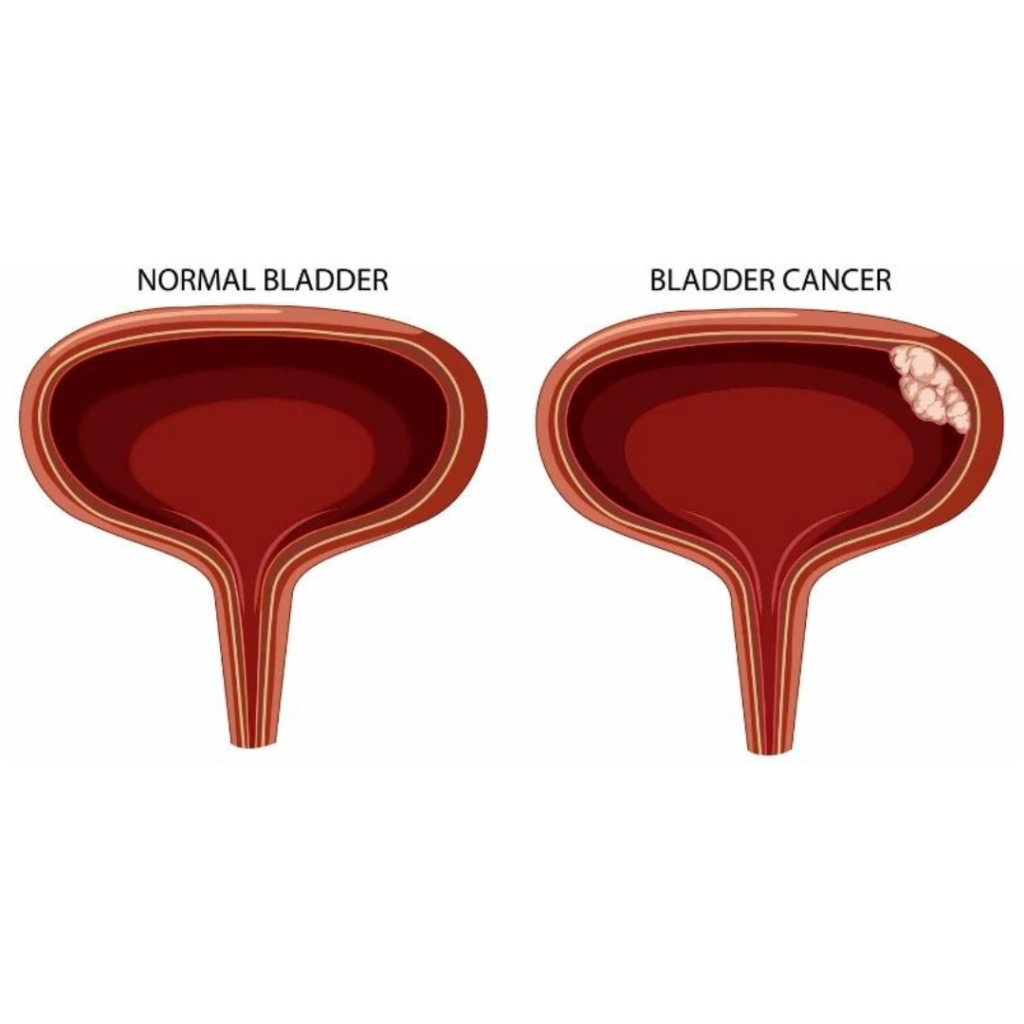
In the realm of health and wellness, some adversaries remain stealthy, hidden behind a veil of silence until they reach a critical stage. Bladder cancer, though often overshadowed by more prominent adversaries like breast or lung cancer, is one such silent threat that can quietly develop without revealing its presence until it’s too late.
In this comprehensive blog, we embark on a journey to unmask the subtle but vital warning signs of bladder cancer, shedding light on the early symptoms that, if recognized and acted upon promptly, can make all the difference in the battle against this insidious disease. So, join us as we navigate the complex landscape of bladder cancer, empowering you with knowledge that may prove to be a lifesaver for yourself or a loved one.
Understanding Bladder Cancer
Before we discuss the warning signs, let’s briefly understand what bladder cancer is. Bladder cancer primarily affects the cells lining the bladder, which is a hollow organ responsible for storing urine. Most cases of bladder cancer start in the urothelial cells, but it can also develop in other cell types.
It can vary in severity, from non-invasive, which means it hasn’t spread to the bladder wall, to invasive, where cancer cells have penetrated deeper layers of the bladder and may spread to nearby organs or lymph nodes. Early detection is vital because it can significantly impact treatment options and long-term outcomes.
The Warning Signs
Bladder cancer is a formidable opponent, known for its ability to develop quietly and without noticeable symptoms in its early stages. However, as it progresses, it can manifest a range of warning signs that should never be ignored. In this section, we will delve into these warning signs in detail, shedding light on what they mean and why they are crucial indicators of a potential problem.
Hematuria (Blood in Urine)
Hematuria refers to the presence of blood in the urine. It can appear pink, red, or even dark brown, depending on the severity of the bleeding.
- Why it matters: Hematuria is often the most apparent and telltale sign of bladder cancer. It occurs because cancer cells may irritate or damage the lining of the bladder, causing it to bleed. However, it’s essential to note that hematuria can also result from various other non-cancerous conditions like urinary tract infections, kidney stones, or trauma. Nonetheless, any instance of hematuria should be thoroughly evaluated by a healthcare professional to rule out serious causes, including bladder cancer.
Frequent Urination
Frequent urination involves a heightened need to urinate more often than usual, often accompanied by a sense of urgency.
- Why it matters: Bladder cancer can irritate the bladder lining, leading to an increased frequency of urination. While this symptom can mimic a urinary tract infection or an overactive bladder, persistent and unexplained changes in urinary habits should prompt a medical evaluation.
Pain or Burning Sensation During Urination
Pain or a burning sensation while urinating is a discomfort felt during the passing of urine.
- Why it matters: This symptom may be associated with a urinary tract infection, but if it persists without infection or other apparent causes, it should raise concerns. In some cases, It can cause irritation, leading to this uncomfortable sensation.
Lower Back Pain
Lower back pain in the lumbar region, unrelated to physical activity or known causes.
- Why it matters: Bladder cancer can cause lower back pain, especially when it reaches an advanced stage and affects surrounding tissues. While lower back pain is a common issue, chronic or unexplained pain should be discussed with a healthcare provider.
Pelvic Pain
Discomfort or pain in the pelvic region, often vague and intermittent.
- Why it matters: Pelvic pain can be a result of various factors, including muscle strain or gastrointestinal issues. However, when it persists or is accompanied by other concerning symptoms, it should be evaluated by a medical professional to rule out bladder cancer or other underlying conditions.
Changes in Urinary Habits
Changes in urinary habits may include difficulty initiating or stopping urination, a weak urine stream, or a feeling of incomplete bladder emptying.
- Why it matters: Bladder cancer can disrupt normal urinary function due to the presence of tumours or irritations in the bladder. Any persistent alterations in urinary habits should be discussed with a healthcare provider.
Weight Loss and Fatigue
Unexplained weight loss and fatigue are nonspecific symptoms involving a noticeable decrease in body weight without dieting or an overwhelming feeling of tiredness.
- Why it matters: In advanced cases of bladder cancer, especially when it has spread to other parts of the body, individuals may experience weight loss and fatigue. While these symptoms can be attributed to various conditions, they should be investigated when combined with other concerning symptoms.
Swelling in the Lower Legs
Swelling in the lower legs can occur when cancer obstructs blood or lymphatic flow.
- Why it matters: Though rare, It may lead to lower leg swelling in advanced cases. While leg swelling is not typically associated with bladder cancer, it may be observed and should be reported to a healthcare professional.
These warning signs, while not exclusive to the disease, serve as crucial indicators that should never be overlooked. Early detection can significantly impact the prognosis and treatment options, making it essential to seek medical attention if you experience any of these symptoms. Remember, bladder cancer is a stealthy adversary, but with knowledge and vigilance, we can unmask it in its early stages, improving our chances of defeating it.
Risk Factors for Bladder Cancer
Understanding the risk factors associated with cancer can help individuals assess their susceptibility and take preventive measures. Some common risk factors include:
Tobacco Use: Smoking is one of the most significant risk factors for bladder cancer. Chemicals in tobacco smoke can be absorbed into the bloodstream and excreted in the urine, potentially damaging the lining of the bladder.
Age: The risk of bladder cancer increases with age, with most cases diagnosed in people over 55.
Gender: Men are more likely to develop bladder cancer than women.
Occupational Exposures: Certain occupations, such as those involving exposure to chemicals like aromatic amines or diesel exhaust, may increase the risk of cancer.
Chronic Bladder Infections: Recurrent or chronic bladder infections may increase the risk of bladder cancer.
Family History: A family history of bladder cancer can slightly elevate an individual’s risk.
Previous Cancer Treatment: Individuals who have received radiation therapy or certain chemotherapy drugs may have an increased risk of developing this cancer.
Arsenic Exposure: In areas with high levels of arsenic in drinking water, there may be an increased risk of this cancer.
Personal History of Bladder Cancer: If you’ve had bladder cancer in the past, you have a higher risk of developing it again.
Diet: Some studies suggest that diets low in fruits and vegetables may be associated with an increased risk of bladder cancer.
Conclusion
The message is clear: Do not dismiss these symptoms, even if they seem mild or transient. While many of these signs can be attributed to other, less concerning conditions, your health is too precious to leave to chance. Consulting a healthcare professional for a thorough evaluation is the first step towards ensuring your well-being.
Furthermore, understanding your risk factors and making proactive choices, such as quitting smoking, maintaining a healthy diet, and seeking regular medical check-ups, can reduce your likelihood of facing cancer. Prevention and early detection go hand in hand in the fight against this disease.
So, let this knowledge be your shield and your guide. Keep your eyes open to the signs, heed your body’s signals, and remember that timely action can make all the difference. Your health is a treasure, and by staying informed and vigilant, you are taking the best possible care of it. Together, we can unmask the silent threat of bladder cancer and protect our well-being for a healthier, happier future.
Dr. Sumit Sharma is an experienced urologist, andrologist, and kidney transplant surgeon with over 20 years of clinical experience. He is the founder of the Department of Urology at multiple hospitals in Gurgaon and has established successful kidney transplant programs across the city.



